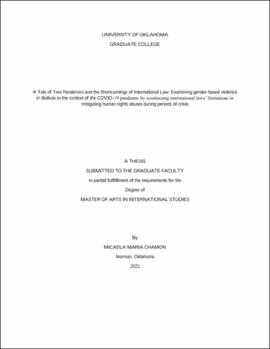| dc.description.abstract | International law was established as a part of the international relations sphere to prevent mass atrocity from ever occurring again in the way that it had throughout World War I and World War II. With the passage of time, it continued to evolve, seeking to address all issues, including human rights. Then, gender-based violence was defined and categorized as a human rights violation. Yet, although numerous international instruments have since been instituted to address and fight the issue, the prevalence of gender-based violence continues to plague communities worldwide.
The COVID-19 pandemic further exacerbated the issue of gender-based violence. This was mostly as a consequence of quarantine measures that sought to mitigate the public health crisis, since they confined women to their potential aggressors and left them with life-threatening choices – staying home and risking domestic violence or in the slight chance that they could, leaving and risking infection of the virus. As a result, domestic violence cases rose all over the world. This prompted a questioning of the true global impact that international law has, particularly in protecting women and their rights. In the case of Bolivia, a country where gender inequality and corruption are deeply rooted in its institutions, cultures, and traditions, accountability measures alone are unable to stop gender-based violence from taking the lives of women during normal circumstance. As a result, it has the most cases of gender-based violence in the continent, and in the case of COVID-19, a surge in those cases was also evident. This thesis, therefore, seeks to examine the interaction of COVID-19 and gender-based violence in Bolivia, and the shortcomings of international law to advocate for proactive measures and a re-evaluation of the elitist and quasi-judicial nature of international law related to this issue. | en_US |
